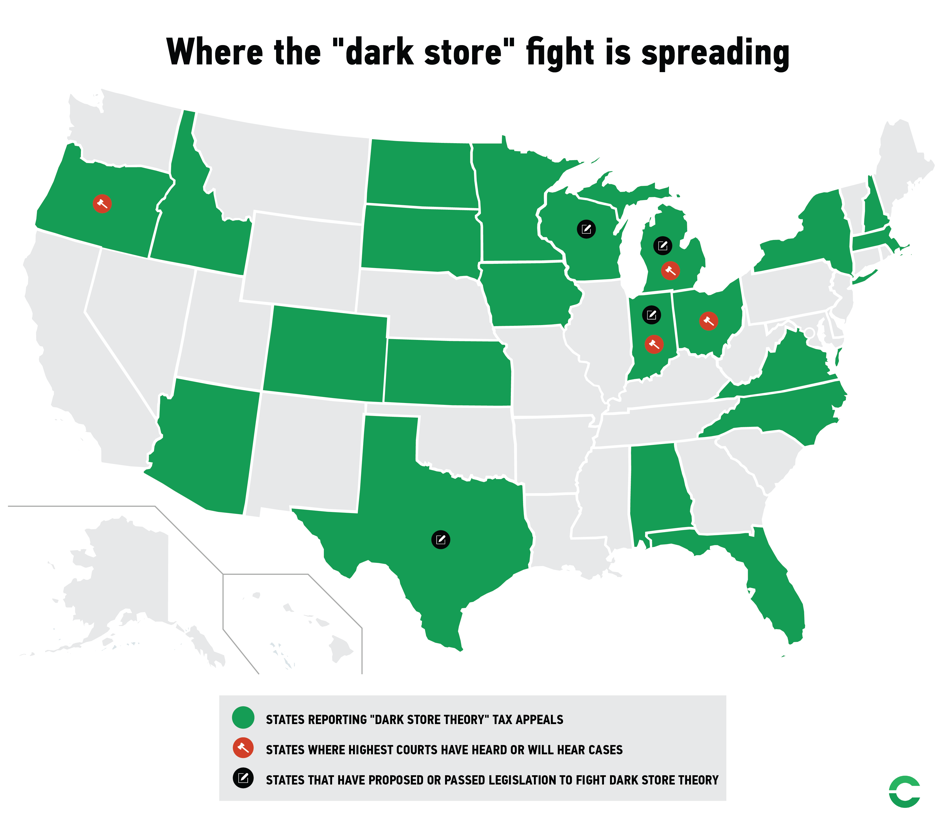 T.H.E.M.
¨We believe in the judgment; we believe this first judgment will take place as God revealed, in America...¨
T.H.E.M.
¨We believe in the judgment; we believe this first judgment will take place as God revealed, in America...¨
 T.H.E.M.
¨We believe in justice for all, whether in God or not; we believe as others, that we are due equal justice as human beings.¨
T.H.E.M.
¨We believe in justice for all, whether in God or not; we believe as others, that we are due equal justice as human beings.¨
After the Retail Apocalypse, Prepare for the Property Tax Meltdown

Big-box retailers nationwide are slashing their property taxes through a legal loophole known as “dark store theory.” For the towns that rely on that revenue, this could be a disaster.
WEST BEND, WI—Kraig Sadownikow doesn’t look like an anti-corporate crusader. The mayor of West Bend, Wisconsin, stickers his pickup with a “Don’t Tread on Me” snake on the back window, a GOP elephant on the hitch, and the stars-and-stripes logo of his construction company across the bumper.
His fiscal conservatism is equally well billboarded: In the two hours we spent at City Hall and cruising West Bend in his plush truck, Sadownikow twice mentioned the 6 percent he has shaved off the Wisconsin city’s operating budget since becoming mayor in 2011, and stressed its efforts to bring more business to town.
So you might be surprised to learn that Sadownikow (he instructed me to pronounce his name like sat-on-a-cow) is personally boycotting two of the biggest big-box retailers in his town, Walmart and Menards, the Midwestern home improvement chain. He’s avoiding shopping at these companies’ stores until they cease what he sees as a flagrant exploitation of West Bend’s property tax system: repeat tax appeals that, added up, could undermine the town’s hard-won fiscal health.
Wauwatosa and West Bend are two of the countless communities around the U.S. confronted with dark store appeals that cities worry could be ruinous. A survey conducted by CityLab of the International Association of Assessing Officers, a society for property valuation and tax policy professionals, found that these types of appeals have been filed in at least 21 U.S. states over the past 10 years. The appeals likely number in the thousands, based on CityLab’s review of legal databases and dozens of interviews with property tax experts.

In Wisconsin, at least 230 cases have been filed across 34 counties since 2015, many of them repeat appeals for the same properties, by the top three attorneys representing retailers. In Michigan, more than $75 million in tax value was lost from the rolls from related appeals between 2013 and 2015. In Indiana, an estimated $3.5 billion in property value is on the line. Texas stands to lose $2.6 billion per year if successful appeals become widespread, according to the Republican state comptroller Glenn Hegar. “No one likes paying taxes, including me,” Hegar wrote in the Austin American-Statesman in 2017. “But I have a significant problem when large corporations and their lobbyists try to manipulate the tax system to lower their property taxes … Dark store theory is corporate welfare of a particularly ugly kind.”
***
Jason Williams, the assessor for the city of West Allis, Wisconsin, pressed flat a stack of PowerPoint print-outs against the trunk of his black Impala. We were standing in the giant moat of parking surrounding a Walmart Supercenter in the neighboring community of Greenfield. It stands next to a smaller big-box store, now subdivided into a non-denominational church and a thrift shop. This second property used to be the Walmart in town, before it became one of many empty shells the discount giant has sloughed off in the past decade as it has upgraded to its preferred, more gigantic model.
Williams chose this spot because this reptilian skin-shedding of big-box chain retailers helps frame dark store theory. It’s about the second lives of these oversize retail spaces, and about how much their outer casings are worth—when they’re vacant, and when they’re occupied. In other words, it’s about what counts as market value.
In the biting Wisconsin wind, Williams showed me a photo of the Sam’s Club in West Allis that he battled last year, and which he is now fighting again. (He didn’t want to visit this store in person with me because of the legal dispute.) As of 2017, the city had valued that store at $11 million, a number based on what the property had cost the owner to buy back in 2001, plus the added value of renovations over the years, adjusted at the going rate of depreciation. These are the methods he uses for every type of property, Williams told me, following those rules in his handbooks. “I’m not saying my numbers are necessarily the best ones out there,” Williams told me. “But they’re what I get when I run the math.”
But a tax agent from Chicago filed an appeal on behalf of Sam’s Club, arguing that the store was worth just $7.2 million, based on the low sales costs of a handful of second-generation big box locations scattered around the state. The comparables that the agent provided included three former locations of the now-defunct electronics retailer American TV, an old Lowe’s, a former Target, and a former Walmart (actually, the same property in Greenfield Williams and I were standing in front of now). All of them sold for between $2 million and $4.5 million between 2012 and 2014: much lower sales prices than what their original owners had purchased them for years before. Some had second-generation occupants; some were bank-owned…..more here
Copyright 2018 Hiram's 1555 Blog
